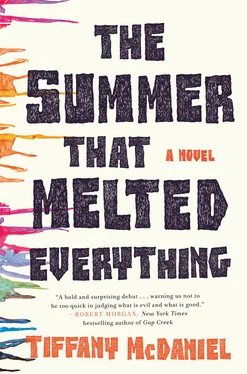“He kicked the tire, said ‘Goddamn,’ and then punched her. Not the first time. Not the last time. Just another time that would black her eye. The man looked down at his fist, stuffed it into his pocket, and went walking toward the town we’d passed a couple miles back.
“The woman sat down on the ground by the car, her dress her best rag. I sat with her, leaning forward with my arms wrapped around my legs. I could feel her fingers trace the scars on my back under the overalls.”
“Your wing scars?” I felt my own back tightening.
He wiped his hand over his mouth, the way an old man might dust food crumbs.
“As she traced them, she said she was sorry. I traced her eye and its coming bruise and said I was sorry. And there, both sorry, we held each other until the man returned with the night and a spare. He smelled like a barstool. Looked like one too, with his wobbling eyes.
“Her hand shook as she held the flashlight while he changed the tire. He yelled at her to stop shaking the damn light like that, so she handed it to me and I held it still. Though I don’t know how.
“After the tire was changed, we drove the dirt roads, his anger driving off. He pointed out the windows at the leaves. Told her to look at all their yellow and red and orange. She squinted and really tried, but said she couldn’t see them. It was the night’s fault, she said, not his.
“He reached over and she flinched. He said it was okay, he wasn’t going to hurt her, he said. He was just unrolling her window. She still looked nervous as he reached across her lap. He unrolled the window quick and beamed at her. Now you can see, he said with hopeful certainty. But she sighed. It was too dark.
“He looked at the tears slipping down her cheeks. He caught one on the back of his finger. He was sorry about earlier, he said as he looked down at her trembling hands folded on her lap. When it got later, he always got sorry about earlier.
“She said it was all right. The way she always did. He slowed the car and parked off the road. Without a word, he got out and me and the woman watched as the dark of him was swallowed by the dark of the woods.
“When he emerged from those woods, he carried something. Fallen leaves that he spread throughout the car. Over the seats and floor, the dashboard, the woman’s lap, my lap. Then he took the flashlight and shined it on a leaf.
“‘It’s not too dark now, is it? Do you see the leaf, Mother?’ he asked. ‘How yellow it is?’ And she answered, ‘Yes, Father, I see. I see now.’
“They always called each other Mother and Father even though they weren’t that to each other.”
“What’d they call you, Sal?”
He did not answer me. He instead smiled and said, “It was beautiful. All them leaves. All that light. The smile on her face. The relief on his that she still loved him. That he hadn’t smacked it out of her just yet. He kept shining that light and she told me to come up from the backseat, onto her lap.
“From there I saw orange maples, yellow oaks, red elms. When there were no more leaves to see, when we had seen each and every one he had collected, he patted his lap and said to me, ‘Here, prop your feet up here.’ I laid my feet there and he laid his hand on top. It was warm. It was nice. And it stayed there the whole way home.”
“Sal, is this the same man with the rope? The same woman beaten in the kitchen? The same boy with the stool for his father?” I wanted to ask those questions, but I feared the answer.
“You asked me, Fielding, why, out of the whole world, why Dresden Delmar?” He looked off into the distance and squinted as if what he saw there was quite possibly the brightest thing in the world. “It’s because her freckles are scattered like the leaves across the woman’s lap. Her eyes shine like the light in the man’s hand. Her hair is as red as the red leaf we passed between the three of us, like the love we could not simply say.”
… with a pleasing sorcery, could charm
Pain for a while or anguish, and excite
Fallacious hope
— MILTON, PARADISE LOST 2:566–568
THE FINALE OF fear is first neared by small labors of bravery. These small labors will eventually lead to the last laboring of the great defeat of the fear altogether. That is the breathing text of hope anyways, that we branch an escape from fear’s trapping circle.
For my mother, her small labor of bravery was learning how to swim. The acoustics of which involved no splashing water, as her swimming was in her fear’s circle and therefore in the house. She was nearing the finale of her fear, and though she was not yet there, Sal was tiring her to the nightmare and introducing her to the dream.
Let it be said that my mother didn’t always live life inside. Before I was born, she went out into the world quite regularly. Soon after I was born, she refused to leave the house without an umbrella. By the time I was one, the umbrella proved not to be enough, and she found herself fleeing the world and its lack of ceiling.
For a number of years, Dad tried to help her conquer her fear. He brought in therapists and read various psychological books himself to better understand. Ultimately, the therapists failed and the answer was not found in any book.
Dad, as well as me and Grand, accepted that she may never leave the house again. It was Sal who did not accept this. He was calling out her world and letting her know it would win a carpenter a prize, but it’d never be a darling of the universe where the stars commit to the real thing.
Every day, he asked her to go outside with him. Every day, she said no, but he was wearing her down with the way he described what she was missing. Simple things like the new bench outside Papa Juniper’s. The Fourth of July parade down Main Lane and its red, white, and blue confetti. The language of the farthest reaching echo shouted in the coal mines, the just-built windmill in the sunflower field outside town, the way the sky looked when standing on the last claim of Breathed land.
His observations and carefully detailed description of the world were making her antsy. Making her wring her hands and suddenly suck in her breath as if for the longest time she’d not been breathing.
I’d find her looking out the windows or craning her neck off the edge of the porch, longing to see beyond the limited landscape her stuck life afforded her.
At the very best, she’d linger on the edge of the porch, reaching her hand out and testing for rain before snapping it back to her chest, swearing she’d felt a sprinkle, when in reality, it was the slight falling from her own eyes.
Melancholy is the woman with ribs like nails and lies like hammers. My mother’s lie was that our house could be enough. That its countries could keep her from feeling like she was missing out. What a housebound woman fears is not the knife in the kitchen drawer. It is the outside being better.
“Stella, please come outside,” Sal begged.
“It looks to pour any minute.” She folded her arms and rubbed her hands up and down her mole-speckled shoulders as she paced in front of the sunny windows.
“You’ll never get her outside.” Dad was passing by and had overheard us on his way to his study. In his hand was a new box of pushpins. The bulletin board had gotten crowded with more papers, more pins, more lines zigzagging this way and that. The progressing investigation meant more stacks of interviews with the families of the missing black boys, of eyewitness statements, of theories and speculation. Stacks and stacks of paper that were taller than Sal, but never him.
The phone number for the hospital was still in his study because Dovey was still there. She’d been kept on suicide watch ever since losing the baby. She was also having a psychological evaluation after she took a black marker and drew a staircase on the wall of her hospital room. She had numbered the steps but didn’t get to her goal of seven million before Otis and the nurses stopped her.
Читать дальше












